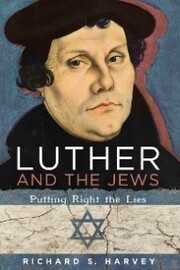Detailansicht
Luther and the Jews
eBook - Putting Right the Lies
ISBN/EAN: 9781498245005
Umbreit-Nr.: 815434
Sprache:
Englisch
Umfang: 152 S.
Format in cm:
Einband:
Keine Angabe
Erschienen am 02.08.2017
Auflage: 1/2017
E-Book
Format: EPUB
DRM: Adobe DRM
- Zusatztext
- Luther and the Jews: Putting Right the Lies is a timely and important contribution to the debate about the legacy of the Protestant Reformation. It brings together two topics that sit uncomfortably: the life, ministry, and impact of Martin Luther, and the history of Jewish-Christian relations to which he made a profoundly negative contribution. As a Messianic Jew, Richard Harvey considers Luther and his legacy today, and explains how Messianic Jews have a vital role to play in the much-needed reconciliation not only between Protestants and Catholics, but also between Christians and Jews, in order for Luther's vision of the renewal and restoration of the church to be realized.
- Kurztext
- To what extent are the children of Holocaust perpetrators to feel remorseful or responsible for their parents' wrongdoing? Is the yearning by those offspring of Nazi sympathizers for forgiveness justified, or should they separate themselves from their parents or relatives and ignore the history?Such dilemmas have gnawed at theologian Martin Rumscheidt ever since, at age eighteen, he discovered his father's complicity in using Jewish slave labor at his workplace, IG Farben. He has written and spoken extensively about his journey in search of what he calls a theology of mourning that would preserve his concept of the reality of God and still recognize the reality--at times grim reality--of life.
- Autorenportrait
- Richard Harvey is a British Jewish believer in Jesus (Yeshua). He taught Hebrew Bible and Jewish Studies at All Nations Christian College, UK, is a past president of the International Messianic Jewish Alliance, and is now a Senior Researcher with Jews for Jesus.<b></b>He is author of<i>Mapping Messianic Jewish Theology</i> (2009).
